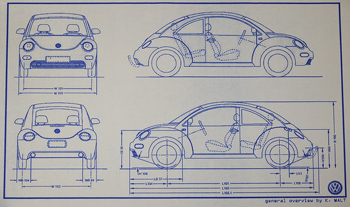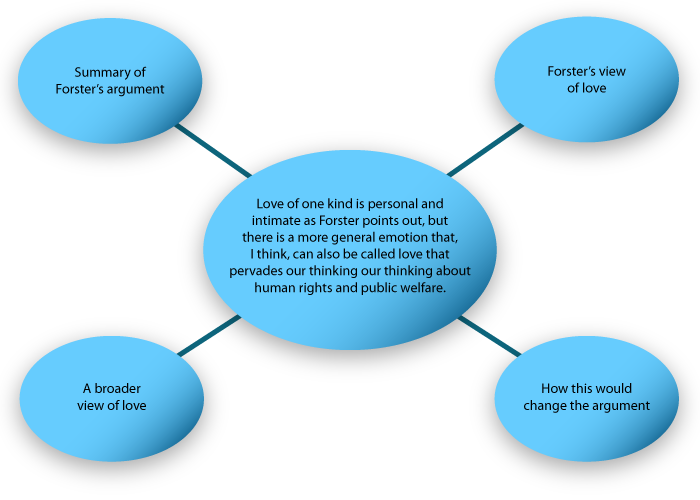Making a Plan

Source: VW New Beetle blueprints, define23, Flickr
So you understand Forster’s claim; what are you going to say about it? Next you should freewrite, cluster, or get some ideas together so that you can begin creating a plan for your response.
You can take one of three basic positions:
- I agree, and here’s why . . . (“Forster’s case is eloquent and persuasive in the following
ways . . .”) - I disagree, and here’s why . . . (“Forster’s case is faulty in the following ways . . .”)
- I agree, but I would make this change . . . (“Forster’s claim could be stronger if he changed the argument in the following way . . .”)
You can agree and say why, disagree and say why, or propose an adjustment. Whatever you do, you must contribute to the conversation that Forster has started. You cannot simply summarize the argument Forster makes.
Do not start writing with the hope that things will fall into place. Make a plan. What is your thesis going to be (some variation of the positions outlined above)? What are your supporting reasons going to be? What objections to your position can you anticipate and address?
One of the strongest ways to develop a thesis sentence in an analytical essay is to start with “Although.” Let’s use this type of thesis to model a plan for an essay.
Although Forster makes a strong case for tolerance rather than love as a basis for public affairs, in making his case, he assumes an overly limited definition of love. Love of one kind is personal and intimate, as Forster points out, but there is a more general emotion that, I think, can also be called love that pervades our thinking about human rights and public welfare.
You might use clustering to plan your essay. To cluster, put the thesis in the center and attach to it the sections of the essay. In this case we attach a summary of Forster’s argument, Forster’s vision of love, a broader vision of love, and how this broader view changes the argument.

Next go beyond the simple plan and write your support for each subtopic to create an outline. For example, in the summary subtopic you will have a chance to comment on the stylistic devices and rhetorical devices the author uses. (Forster extensively uses repetition and parallelism. He is also a master of using concrete examples to make abstract points.) You can learn more about rhetorical strategies in the lesson titled “Style/Syntax” which includes another discussion of Forster’s “Tolerance.”
If you were to do more planning for the example essay, where would you place each of the following topics? Decide what answer is correct, and click on the answer to check your understanding.
- The error of Forster’s argument is that he sees tolerance as the best we can do with people we
don’t know. - Summary of Forster’s argument
- Forster’s view of love
- Broader view of love: human concern
- How a broader view would change the argument
- The argument can stand with one change: tolerance should be identified as the bare minimum for public policy, and human regard should be identified as the preferable basis.
- Summary of Forster’s argument
- Forster’s view of love
- Broader view of love: human concern
- How a broader view would change the argument
- When negotiating public policy with people whom we do not know and think we might dislike, our choice is either to kill them or endure them.
- Summary of Forster’s argument
- Forster’s view of love
- Broader view of love: human concern
- How a broader view would change the argument
- Forster is right that we need to put up with each other rather than fighting; this part of his argument is sound.
- Summary of Forster’s argument
- Forster’s view of love
- Broader view of love: human concern
- How a broader view would change the argument
- There is something less intense and more general than personal love that can still be called love: human regard.
- Summary of Forster’s argument
- Forster’s view of love
- Broader view of love: human concern
- How a broader view would change the argument
- Human regard is a type of general love for mankind.
- Summary of Forster’s argument
- Forster’s view of love
- Broader view of love: human concern
- How a broader view would change the argument
- Forster says love is personal.
- Summary of Forster’s argument
- Forster’s view of love
- Broader view of love: human concern
- How a broader view would change the argument
- Forster says love cannot overcome dislikes.
- Summary of Forster’s argument
- Forster’s view of love
- Broader view of love: human concern
- How a broader view would change the argument
- Human regard operates in public policy successfully all the time.
- Summary of Forster’s argument
- Forster’s view of love
- Broader view of love: human concern
- How a broader view would change the argument
- Forster says love has always failed as a force in public policy.
- Summary of Forster’s argument
- Forster’s view of love
- Broader view of love: human concern
- How a broader view would change the argument
- Tolerance is a better basis than love for public policy because we cannot love those we do not know.
- Summary of Forster’s argument
- Forster’s view of love
- Broader view of love: human concern
- How a broader view would change the argument
- As a basis for public policy, tolerance allows us to live and work together in peace.
- Summary of Forster’s argument
- Forster’s view of love
- Broader view of love: human concern
- How a broader view would change the argument
So far you have read and chunked the text, clustered your ideas, formulated a thesis, and developed an outline of support for the thesis.
With your thesis and outline to guide you, you are ready to write a draft of the body paragraphs of your essay. (Yes, just the body paragraphs!)